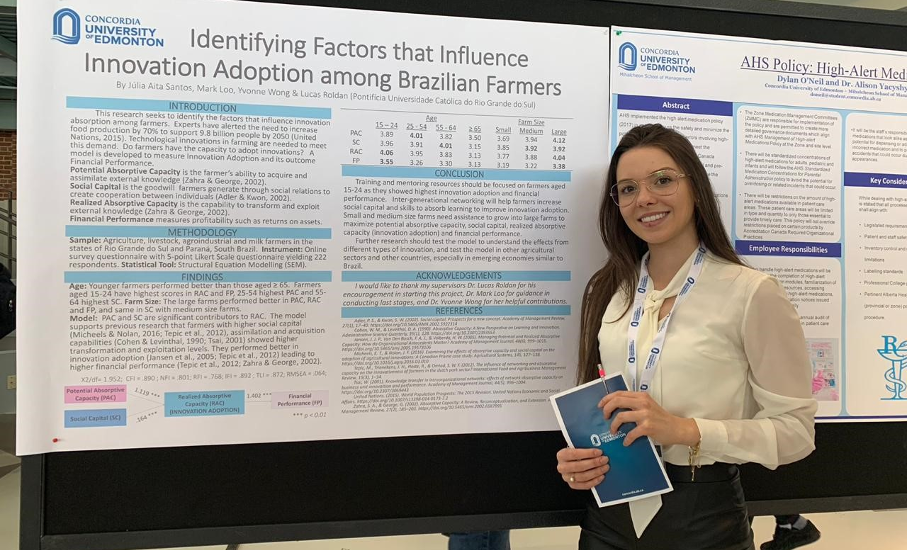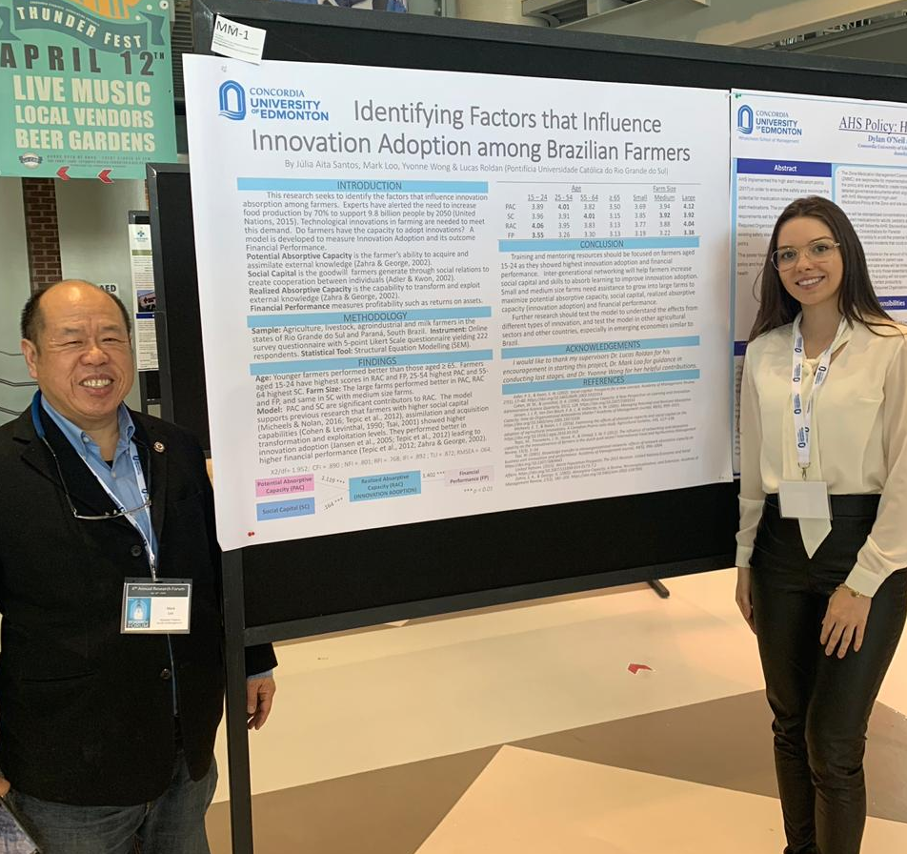Júlia Aita presented paper during exchange at Concordia University of Edmonton International
 Business School student, Júlia Aita, presented her final undergraduate article in a conference at Concordia University of Edmonton International, as she was working on her academic mobility program in Canada. She ranked 4th with a paper on innovation in Brazilian agribusiness.
Business School student, Júlia Aita, presented her final undergraduate article in a conference at Concordia University of Edmonton International, as she was working on her academic mobility program in Canada. She ranked 4th with a paper on innovation in Brazilian agribusiness.
The quantitative research employs the method for modeling of structural equations to study the factors that influence the employment of innovation methods in agribusiness. Overall, the investigation involved 222 farmers from Rio Grande do Sul and Paraná. The hypotheses have been confirmed: social capital and potential absorptive capacity influence innovation positively and generates better financial performance.
“Representing PUCRS in a different setting and speaking a language other than Portuguese was such a unique experience. I am thankful I shared what I knew about agribusiness in Canada. This is such a propeller of the economy of Brazil. I owe this to my advisor Prof. Lucas Roldan, to Prof. Adroaldo Lazzarotto and to the entire PUCRS team, who gave me the chance to have an international experience. I am also thankful for Concordia professor Dr Mark Loo, who recommended me for the forum and advised me in the project”, she recognizes.
Personal development
 This was Júlia’s first academic mobility program. She spent the first semester of 2019 in Canada and will finish her degree in Business Administration – International Trade on Aug 31. “I have been very fond of the atmosphere of Concordia and its values since the first research I carried out. Since the day I got here up until now, the institution has been giving me good impressions. It is a small institution that values cultural diversity a lot and welcomes international students. It constantly promotes intercultural events and makes us feel part of the community”, she says.
This was Júlia’s first academic mobility program. She spent the first semester of 2019 in Canada and will finish her degree in Business Administration – International Trade on Aug 31. “I have been very fond of the atmosphere of Concordia and its values since the first research I carried out. Since the day I got here up until now, the institution has been giving me good impressions. It is a small institution that values cultural diversity a lot and welcomes international students. It constantly promotes intercultural events and makes us feel part of the community”, she says.
The student decided to apply for a mobility program to brush up her English, face new challenges that could get her out of her comfort zone and to top off her degree. In her view, this experience brought many challenges and many opportunities for self-knowledge. “The academic mobility experience provides a natural personal evolution, but we can learn a lot of things we never expect to learn from the number of situations we are faced with. It makes us more complete as professionals, because we have the chance to develop a much-desired asset in today’s market: resilience“, she says.
In class, she had the opportunity to get to know the business scenario under the Canadian perspective, as she learned how businesses wok in the country. “It is also interesting to note the differences in the teaching methods and in the system as a whole. Professors employed practicum work and dynamism in class. We could see how willing and engaged students were”, she says.
During the time she spent at the Canadian university, Júlia participated in events that connected students with several professionals. Design thinking workshop, career fairs and the research forum itself provided connected her to faculty and researchers in an effort to strengthen networking activities.
Preparation and adaptation
 After she decided where she wanted to go, Júlia needed to deal with a number of things, including documentation to and clothing as winter temperatures in Edmonton could be -40°C. “PUCRS, through the academic mobility team, guided me both in issues involving documentation and pre-departure communication with the University. The support of the academic mobility team was essential to make this exchange happen“, she praises.
After she decided where she wanted to go, Júlia needed to deal with a number of things, including documentation to and clothing as winter temperatures in Edmonton could be -40°C. “PUCRS, through the academic mobility team, guided me both in issues involving documentation and pre-departure communication with the University. The support of the academic mobility team was essential to make this exchange happen“, she praises.
In addition to the weather, Julia claims that adapting to local culture is a crucial factor. “I am sure that Canada is an ideal country, because it is a very diverse country and open to people from all over the world,” she says.